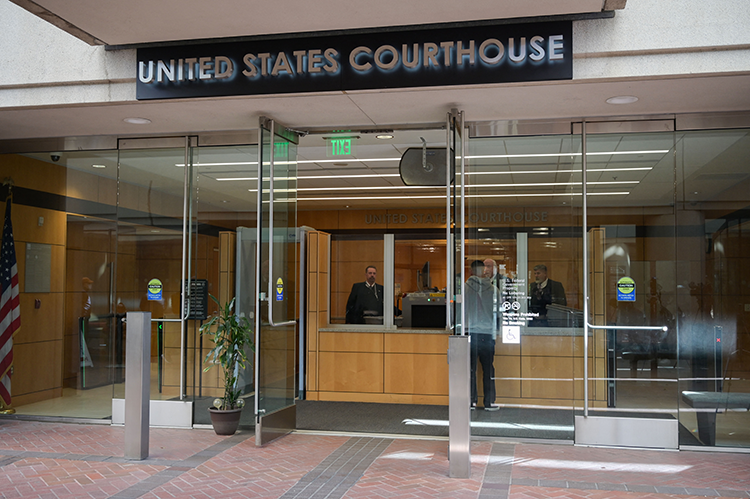A resource center that combats judicial threats should be formed, ABA House says

The U.S. Marshals Service has identified a rise in security threats against court personnel. (Photo by Samantha Laurey/AFP via Getty Images)
The U.S. Congress should enact legislation that establishes a State Judicial Threat Intelligence and Resource Center, the House of Delegates said at the ABA Annual Meeting in Chicago on Monday.
The Judicial Division submitted Resolution 516, which calls on federal lawmakers to pass the Countering Threats and Attacks on Our Judges Act or a similar law that creates the center. Its purpose would be to provide technical assistance and training on state and local judicial security; monitor threats; develop standards for incident reporting; and create a national database that tracks and shares threat information.
“We have all heard about judges who were hunted down by people and shot and killed in their driveways,” said John C. Allen IV, a member of the National Conference of the Administrative Law Judiciary Executive Committee, who introduced the resolution.
“Old boundaries we used to respect, old boundaries that were set in place have been eroded and decayed to the point where judges have become targets for people who don’t have the character or integrity to restrain themselves when things simply just don’t go their way,” he added.
The U.S. Marshals Service identified a significant rise in threats and inappropriate communications against federal judges and court personnel, from 926 incidents in 2015 to 4,511 in 2021, according to the Administrative Office of the U.S. Courts’ annual report in 2022. The report accompanying Resolution 516 cites this data and notes there is no similar agency monitoring or addressing threats to the nearly 30,000 members of the judiciary in state and local courts.
The U.S. Senate passed the Countering Threats and Attacks on Our Judges Act on June 12. A companion bill was introduced in the U.S. House of Representatives, where it was referred to the House Committee on the Judiciary on April 19.
Follow along with the ABA Journal’s coverage of the 2024 ABA Annual Meeting here.
The Countering Threats and Attacks on Our Judges Act—and Resolution 516—support placing the State Threat Intelligence and Resource Center within the State Justice Institute. It was established by federal law in 1984 to award grants to help improve the administration of justice in state courts.
Julian Mann III, the former chief administrative law judge for North Carolina and chair of the Judicial Division, also spoke in favor of the resolution, which the House overwhelmingly adopted.
Mann shared a personal story about being stopped by a news article with this headline in July: “Letters stained with suspected blood sent from NC prisoner to judge overseeing his case.” On one page, the prisoner reportedly had written: “You should be afraid not to report this. What will happen to you and your body when I’m located & you didn’t report me: you overlook’d me continuously?”
Mann contends that in North Carolina and many other states, no central repository collects and shares information on these events.
“If it had not been for this publication, I would not have known about this threat,” he said. “This legislation will provide that national resource.”
The Government and Public Sector Lawyers Division, Section of State and Local Government Law, and Section of Litigation co-sponsored Resolution 516.
In 2023, the House adopted a resolution encouraging judicial leaders to study the impact of trauma on judges, their families and staff and recommend steps to improve their safety and mental wellness.
It followed the 2022 arrest of an armed man in Chevy Chase, Maryland, who is accused of attempting to kill U.S. Supreme Court Justice Brett Kavanaugh. Two years earlier, a disgruntled attorney shot the husband of U.S. District Judge Esther Salas and killed her son in their New Jersey home.
In 2021, the House also supported the Daniel Anderl Judicial Security and Privacy Act, later passed by Congress with bipartisan support. The law makes it more difficult for violent individuals to find judges’ addresses and personal information online.
See also:
ABA urges Congress to prioritize judicial security amid recent attacks on judge and court officer
Write a letter to the editor, share a story tip or update, or report an error.



